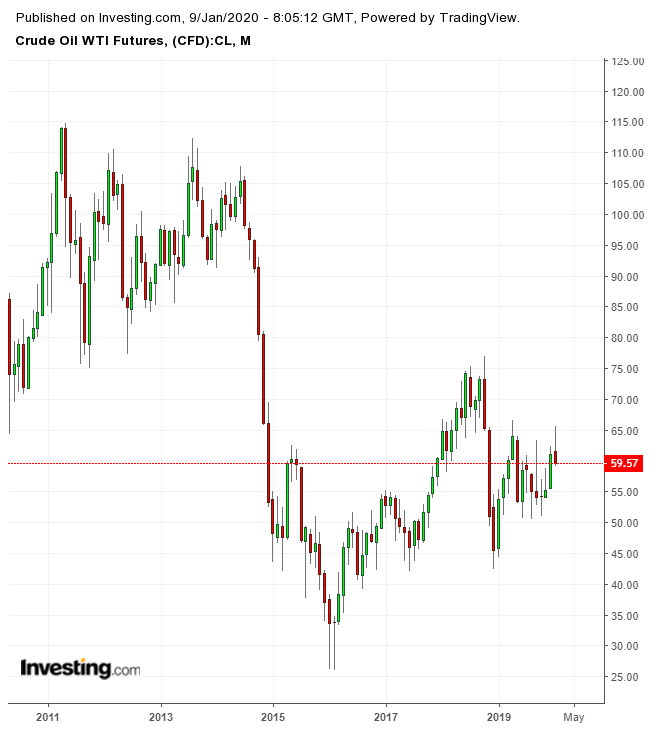Oil markets began 2020 with some volatility brought on largely by rising geopolitical tensions in the Persian Gulf.
Prices initially seemed indifferent to the political instability and protests in Iraq, which were viewed as internal issues that could potentially impact Iraq’s oil production and transportation.
However, agitation quickly developed between Iranian-backed militias and the United States, turning into an outright conflict that escalated from a slain U.S. contractor, targeted bombings, an assault on the U.S. embassy, the killing of a top Iranian general and finally, on Tuesday night, missiles aimed at Iraqi military bases housing U.S. personnel and equipment. For now, both Iran and the U.S. have given signals that they are backing down from the conflict.
Below we address the key issues reflected in the oil markets' reaction to these events and what to watch for next.
What Oil Price Moves Reveal
Oil prices jumped about 4% in early Wednesday trading in Asia and then Europe when news broke that Iran had fired ballistic missiles at two Iraqi military bases that house U.S. military personnel in northern Iraq. However, when it appeared that the missiles had not caused any loss of life and President Trump tweeted “All is well!," oil prices started to back off those highs.
Even when the news seemed terrible, the prices failed to surge dramatically because markets did not see a high probability that war would break out between the U.S. and Iran. Midday on Wednesday Washington, D.C. time, the President addressed Iran and strongly indicated that tensions had eased, so the oil dropped such that WTI was down nearly 5% by mid-afternoon on Wednesday.

The key takeaways: First, even after Iran launched missiles at the military bases, the market still assigned a low—though slightly elevated—likelihood of a chance for war. Second, after President Trump spoke, the market became quite confident that war would not break out.
As I explained in September after the attacks on Saudi Aramco's (SE:2222) oil facilities, the market already priced in the expected value for the scenario of a war that would impact millions of barrels of oil for a sustained amount of time. Still, prices are not significantly elevated since the market believes there is a low probability for war or other significant disruptions to oil.
The price of oil dropped significantly after the President spoke on Wednesday because he successfully convinced the market that the risk of war should return to the level it was at in December—or perhaps be a little lower than it was in December.
Before the missile attacks Tuesday night, the market was dealing with a measure of uncertainty as pundits made predictions about how Iran might “retaliate” for the death of one of its generals. These questions make markets nervous, but now that the situation appears to be resolved, for the time being, markets have relaxed with a sell-off.
Are Markets Undervaluing Geopolitical Risk?
Some analysts believe markets are undervaluing geopolitical risks, however, they are comparing today’s events to previous times of strife and crisis situations in the Middle East and are anticipating similar reactions. This comparison is flawed because the supply and demand fundamentals are markedly different now compared with 1990 or 2003: before the Gulf War and the U.S. invasion of Iraq, oil prices spiked significantly and remained elevated.
The incredible growth of the U.S. oil and gas industry over the past decade has guaranteed the United States a measure of energy security that it has not had since the 1960s, and the world has notably more oil supply that is not tied to the Middle East. As a result, the market today remains fundamentally over-supplied with inventories in OECD countries remaining extremely high.
Even with the upcoming signing of a Phase One trade deal between the U.S. and China, the global economic outlook continues to lag and demand for oil in 2020 is barely expected to grow, according to most economists. In short, analysts are attempting to identify comparisons between the markets today and the past, while fundamentals are quite different.
Threats To Watch
While the threat of conflict between the U.S. and Iran appears to be declining, real hazards remain to Iraq’s oil production.
Industry in Iraq is spread out between the northern and southern regions of the country. The Kurdistan Regional Government exports some oil from the Ceyhan port in Turkey, but most of Iraq’s oil exits through its southern port on the Persian Gulf, at Basra. The underlying political tensions concerning Iran’s involvement in Iraq have not been resolved and there is still a potential for that to impact Iraqi oil production and transportation.
While slowdowns or shut-ins at Iraqi oil fields and export terminals might not be as sensational or jeopardize as many barrels of oil as a war between the U.S. and Iran, possible interference with Iraq’s oil output cannot be ignored.
Iraq exports heavy oil—a type of crude that is in demand globally—and is the fifth largest oil producer in the world, or possibly the fourth, given recent production increases. If the conflict were to impact Iraq’s oil fields or export terminals, the global oil supply could be impacted.
